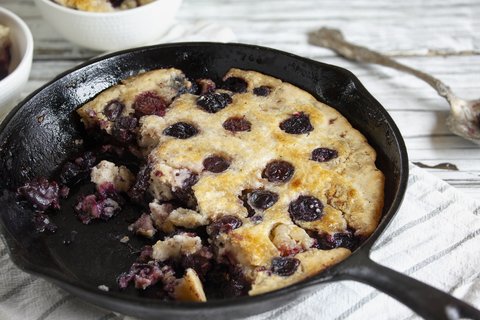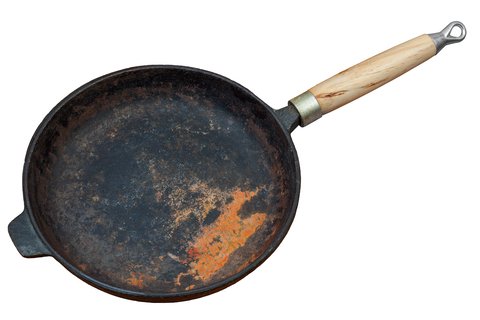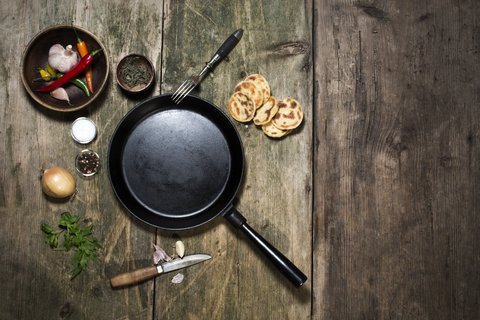This post was originally published on March 7, 2023
The latest update to this post was made 1 year ago.

How To Clean Your Cast Iron Cookware
Cast iron is a popular choice for cookware due to its superior heat retention and durability. It is typically made of iron alloyed with carbon, as well as other elements like chromium, nickel, and molybdenum. Cast iron cookware is extremely durable and long-lasting, but it does require regular care and maintenance to keep it in good condition. Proper cleaning helps keep cast iron from rusting or developing an off taste from food residue build up.
Cast Iron Benefits
Cast iron cookware has long been prized for its durability, heat retention and even cooking results. Not only that, but it’s also incredibly easy to clean and maintain. Here are some of the benefits of cast iron cookware:
- It is extremely durable. Cast iron is an extremely hard material and will not warp or easily scratch like other materials such as aluminum or stainless steel. It can take a lot of abuse from daily use in your kitchen without showing signs of wear and tear.
- Cast iron is known for its superior heat retention compared to other materials. This makes it ideal for searing food at high temperatures since it will retain the heat much better than other types of cookware.
- It can be used directly on a grill or over an open flames without burning or warping the material.
- Cast iron provides even heating throughout the entire surface area due to its heavy weight and thickness. This ensures that food cooks evenly with no hot spots or cold spots which increases efficiency while cooking and reduces the time spent monitoring food while in use.
Before You Clean
Before you clean your cast iron cookware, it’s important to understand the basics of how to care for it.
- Do not use soap when cleaning your cookware – instead, just scrub with hot water and a stiff brush or steel wool.
- Avoid putting cold water on your pan when it is hot, as this can cause the metal to crack or warp.
- After use, coat the interior of your cookware with a thin layer of vegetable oil to keep it in good condition and prevent rusting.
- Ensure that all pans are completely dry before storing them away as any remaining moisture can also lead to rusting.
Cleaning Your Cast Iron Pan
Start cleaning your cast iron pan as soon as you are done cooking and the pan has cooled down. You should not clean the pan using dish soap, by placing it in water in the sink or by placing in the dishwasher. You can use steel wool, hot water, salt or vinegar in the cleaning process.
- Steel Wool: Use steel wool and warm/hot water to scrub the surface of the pan. This will remove buildup and food residue. Rinse well with water (no dish soap). Dry the pan immediately to prevent rust.
- Use Salt: To clean a cast iron pan with salt, pour a generous amount of coarse-grained salt into the pan. Using a paper towel or cloth, scrub the surface of the pan with the salt until it is clean. Rinse off any remaining salt and dry your pan immediately to prevent rusting.
- Use Vinegar: For tougher stains, use a solution of equal parts water and distilled white vinegar to soak your cast iron for 15 minutes. After soaking, scrub away any remaining stuck-on food with a brush or rag. Rinse off the vinegar and dry your pan immediately to prevent rusting.
- For stubborn caked on foods that aren’t releasing using the above methods, you can try boiling some water in the pan to loosen the stuck on food item(s). Once the water is boiling, let it go for a couple of minutes, then drain the water. When safe to touch, try scrubbing with steel wool or salt as outlined above. Add some salt to the boiling water to assist with extra stubborn stains. Be sure to rinse well and dry the pan!
Once the pan is completely dry, dip a paper towel or cloth in some vegetable oil and wipe it over the interior of the pan. This will act as a seasoning and prevent rust.
Below are some items that can help with cleaning and seasoning:
Removing Rust
 Removing rust from cast iron cookware is a special challenge. The most important step is to start with a thorough scrubbing of the entire surface area. In this case, we’ll use hot water, dish soap, and a stiff-bristled brush or steel wool to remove any visible rust. If necessary, use a metal scouring pad to remove stubborn spots of rust. On extra bad pans, try soaking in 50/50 water and white vinegar mix, with the pan fully submerged in the mixture. This can take an hour or two, then try the rust removal process again. Make sure all the rust has been removed before proceeding.
Removing rust from cast iron cookware is a special challenge. The most important step is to start with a thorough scrubbing of the entire surface area. In this case, we’ll use hot water, dish soap, and a stiff-bristled brush or steel wool to remove any visible rust. If necessary, use a metal scouring pad to remove stubborn spots of rust. On extra bad pans, try soaking in 50/50 water and white vinegar mix, with the pan fully submerged in the mixture. This can take an hour or two, then try the rust removal process again. Make sure all the rust has been removed before proceeding.
Re-Seasoning
Re-seasoning your cast iron cookware is an important step to ensuring that it stays in good condition and lasts a long time.
- Clean your pan as described above, dry it off
- Rub a thin layer of oil on the inside surface using either vegetable or olive oil. Be sure to get every part of the interior with the oil!
- Place a drip pan or sheet of foil under the pan (to catch any oil run off)
- Place the pan upside down in an oven preheated to 350°F for one hour, then turn off the oven and allow it to cool before taking out.
- After cooling, wipe off any excess oil with a cloth or paper towel.
- This process should be repeated every few months or as needed depending on how often you use your cast iron cookware.
The above process will condition and create a protective coating that will help prevent future rust buildup ensuring your cast iron stays in good shape for years to come!
Storing Your Cast Iron Cookware
When storing your cast iron cookware, be sure to take the proper precautions. Before storing, the cookware must be dried thoroughly with a cloth or paper towel. Excess moisture can cause rusting, so you want to make sure that it is completely dry before putting it away. After drying, lightly coat the pan’s surface with cooking oil and buff off any excess. This will help prevent oxidation and rusting while in storage. Make sure to store your cast iron cookware in a cool and dry place away from humidity and direct sunlight. Avoid stacking pans on top of each other as this could damage their surfaces and cause them to retain moisture longer than desired. Additionally, try not to store food inside the pan for extended periods of time as this can lead to corrosion over time if left unchecked.

Common Mistakes To Avoid
- One common mistake to avoid when cleaning cast iron cookware is not drying it thoroughly after use. Cast iron should be dried completely before storage as any moisture can cause rusting and damage the surface. To dry the pan, use a clean cloth or paper towel to remove excess water and then place it on a stovetop over low heat until completely dry.
- Another common mistake is using harsh cleaners or steel wool on cast iron cookware. Harsh abrasives can strip away the seasoning layer that forms on the cooking surface, leaving it vulnerable to scratches and rusting. To clean cast iron, use hot water and mild soap with a sponge or soft brush for stubborn residue. Then season by rubbing with oil before storing away in a cabinet or drawer.
- A third common mistake is neglecting regular maintenance of your cookware such as reseasoning regularly and removing rust immediately when spotted. Reseasoning helps maintain the non-stick properties of your pan while removing rust quickly prevents further corrosion from occurring which may lead to damage beyond repair if neglected for too long.
Conclusion
In conclusion, cleaning cast iron cookware can be a simple process that requires minimal effort and basic supplies. Start by wiping away any food with a damp cloth or sponge. If there are any stuck-on bits of food, such as burnt-on cheese, use salt to scrub them off. Avoid using harsh chemicals or soaps during the cleaning process as it can strip the seasoning from the pan. Finally, dry the pan thoroughly and rub it with oil before storing it away. With regular maintenance and care, your cast iron cookware will last for many years!
In The Market?
If you are in the market for some cast iron or need a refresh, check out these suggestions:
Tags: #castiron #castironcooking #castironskillet #cookware #castironpan #food #cooking
![]()

Be the first to comment